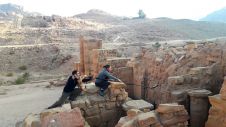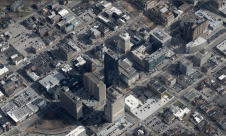5th FIG Regional Conference
Promoting Land Administration and Good Governance
The 5th FIG Regional Conference was held in Accra, Ghana from 8th to 11th March 2006, together with the 37th Ghana Institution of Surveyors Conference. This was the first time that FIG held its regional conference in West Africa. It should be mentioned that interest in Ghana and the region, particularly Nigeria, exceeded all expectations. Almost 650 participants attended, representing fifty countries, twenty African and thirty overseas. The conference was organised by FIG and the Ghana Institution of Surveyors (GhIS) in co-operation with the Ministry of Lands, Forestry and Mines and the Land Administration Program (LAP). Co-hosts included FAO, UN-Habitat, the UN Economic Commission for Africa, RECTAS, AFREF, the International Society for Mine Surveying, the Joint Board of Geospatial Information Societies and ISPRS. Sponsors and exhibitors covered the whole field of surveying and geomatics. The theme of the conference ‘Promoting Land Administration and Good Governance’ was well selected and most timely, not only for Ghana but throughout Africa. The big land-administration programme in Ghana provided good input both to the technical programme and in discussions.
The opening ceremony featured keynote addresses by Senior Minister HE John Henry Mensah on behalf of His Excellency Mr John Agyekum Kuffour, President of the Republic of Ghana, and by Prof. Holger Magel, FIG president. Greetings were conveyed by Hon. Minister, Prof. Dominic Fobih, Minister of Lands, Forestry and Mines and Prof. Ian Dowman, ISPRS, on behalf of JB GIS and other partners. The welcome address was given on behalf of GhIS by Dr B. E. K. Prah, president. In his speech Senior Minister Mensah announced that six organisations related to Land Administration are to be reorganised into a one-stop-shop environment.
The technical programme included 25 technical sessions and workshops on AFREF, education in Africa and the core cadastral domain model, with specialisation in the Social Tenure Domain Model. Running five sessions in parallel, these attracted much attention, with over two hundred delegates attending them; listeners at plenary sessions were more than 350. A total of almost 150 papers were presented and published. The technical exhibition was compact, with stands covering surveying and geomatics technology internationally and in Ghana.
Conference discussed how land titling was not always the best approach. Many projects failed. Innovative, cheap (but high-tech and pro-poor) approaches were needed. Reorganisation was required within Land Administration organisations, where tasks and activities were fragmented over many organisations/responsibilities. There should be much more focus on customary and informal tenures; we had to learn from the past that these issues received insufficient attention. UN Habitat’s Global Land Tool Network supports the dissemination of knowledge and focuses on the development of innovative, pro-poor and gendered land tools.
Politics, Places, People
In his closing address Prof Holger Magel emphasised how it was FIG’s role to help local organisations build capacity in professional and institutional development, and to advise politicians and the public at both global and national level. FIG was, he told conference, committed to Africa. The challenges facing FIG and surveyors could be considered as the three Ps: Politics, Places and People. Political challenges included indigenous approaches (e.g. respect for stools and customary rights), public administration approaches, good governance and public/private partnership. All this had to be made to work in parallel, he said. Challenges involving places included space and resources for people, rapid urbanisation, sustaining rural communities, and environmental degradation. Here it was important to recognise and to make inter-relationships work. The challenges concerning people were appropriate levels of education and community planning and development, ethical and cultural behaviour and values, services to the public, facilitating decision-making and conflict resolution, enhancing civil society, and inclusive cities. Building capacity was the issue here, especially in relation to pro-poor activities such as the social-tenure domain model (see conference proceedings).
Prof Magel concluded that good governance was mainly based on good land administration and needed both civil society and committed professionals, and he recommended the following.
- Development from cadastre, registry, land-use planning, valuation and so on towards integrated land management based on GDI/GIS and a modern geodetic reference framework. Think big: start small but do away with the traditional, colonial cadastre. Respect the needs of society!
- Move from Country Reference Frames toward an African Reference Frame (support the AFREF Project).
- Move from a tendency to focus on land issue and land management toward integrating with marine and coastal management.
- Develop from state survey towards more privatisation, balancing public-private-partnerships.
- Replace the current focus on single activities by expanded co-ordination, co-operation and communication - locally, nationally and globally: ‘We are not alone!’
- Move from a base in sectored education toward comprehensive education; “well grounded specialised generalists” are needed at technical, managerial and policy levels.
- Enhance from (only) measur-ing and documenting toward active participation in strategic and planning decision-making in environmental, urban and rural development.
- Reorganise from too many separated authorities toward a single, land-sector agency.
Prof Magel insisted upon the need for inspired and best-educated students and young surveyors: excellent teachers, professors and researchers. But also open-minded directors of survey authorities, courageous entrepreneurs in survey companies, attentive, listening politicians, and public interest …to build mother Ghana and to make Ghana and the world a happy place to live in.

Value staying current with geomatics?
Stay on the map with our expertly curated newsletters.
We provide educational insights, industry updates, and inspiring stories to help you learn, grow, and reach your full potential in your field. Don't miss out - subscribe today and ensure you're always informed, educated, and inspired.
Choose your newsletter(s)
























